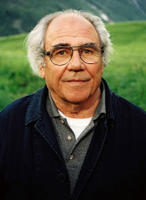 Jean Baudrillard wrote years before Katrina struck the U.S. Gulf coast, “We have within in us an immense desire for events.”
Jean Baudrillard wrote years before Katrina struck the U.S. Gulf coast, “We have within in us an immense desire for events.”Immunity, impunity, corruption, speculation and laundering – come what may, we are moving towards a limit state of zero responsibility …. Automatically, we want to see an event of maximum consequence, a fateful event, to repair this scandalous non-equivalence with a sudden, exceptional responsibility. ("Real Event, Failed Event: Singularity of the Event")To reflect on current affairs: When that fateful event arrives and fails to repair the "limit state of zero responsibility," it is in part because we have a continuity bias. "Immunity, impunity, corruption" being the meme, these are heightened and developed in the course of telling the hurricane story.
It is also undeniable that "zero responsibility" is a highly sought-after real world condition, and so it works in tandem with our ideas and expectations.
The medium through which the event passes, as Baudrillard notes, is news and information, and that is in itself, he says, a tragedy. Converting discontinuous incidents into storylines produces narrative patterning: "[A] story has meaning only when it fits into some unfolding of events, some rational purpose.” ("The Impossible Exchange")
The information production associated with Katrina teaches us about our Civil War reading: "Only the consideration of an end allows us to conceive a continuity, and our sciences and technologies have accustomed us to see everything in terms of a continuous evolution…" says Baudrillard. As a Civil War narrative moves towards its foregone conclusion, so Katrina will "end" happily in the overturning of the scandalous "limit state of zero responsibility." That seems to be the intended payoff for news readers who are following the disaster vicariously.
In the course of the catastrophic Civil War, some radicals sought to repair the scandalous non-equivalence of prosperity based on slavery; and some authors now craft books based on the reader's presumed sense of justice in repairing whole streams of non-equivalencies such as McClellan's undeserved high office, Pope's bragging, the North's "unfair" advantages in materiel, etc.
History writing, like newspaper writing, can become a matter of staging and resolving scandalous non-equivalencies. The history writer has the power to set up and resolve these to the reader's satisfaction. The newspaper writer hopes real world agencies will resolve the scandal story he has developed for an ending readers can enjoy. And where unresolvable for any reason, non-equivalence provides tension for the next edition of the paper.
This is not to say scandals are literary figments but to argue for the totality and discontinuity of the event.
Baudrillard: “If we see history as a film (which it has become, whether we like it or not), then the ‘truth’ of information consists in the post-synchronization, the dubbing and subtitling of the film of history.”
Which is why it is unfortunate that events remote in time or place must pass through "information" for us to experience them.
(Previous Baudrillard comments here and here.)



